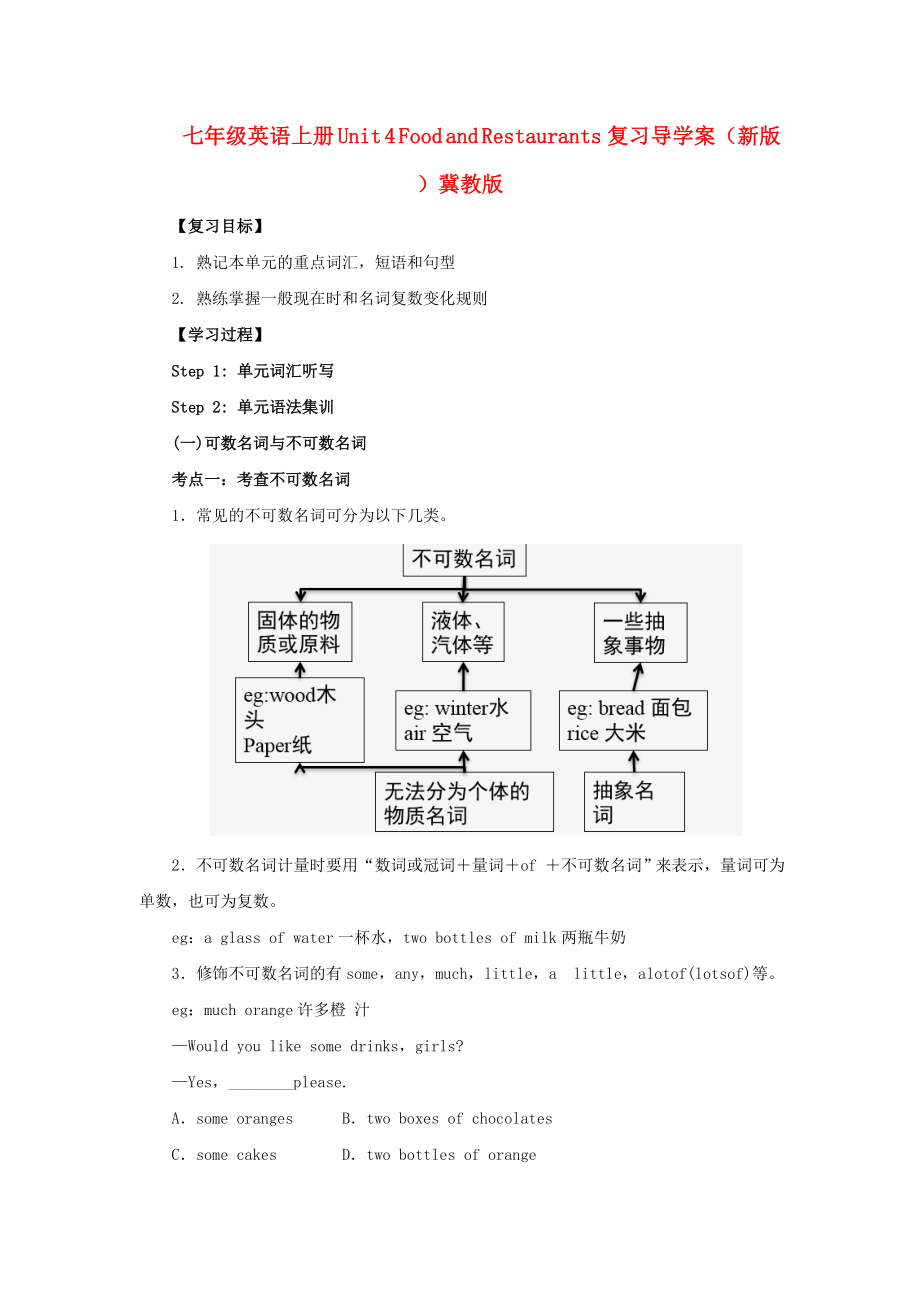《七年級英語上冊 Unit 4 Food and Restaurants復(fù)習(xí)導(dǎo)學(xué)案(新版)冀教版》由會員分享��,可在線閱讀��,更多相關(guān)《七年級英語上冊 Unit 4 Food and Restaurants復(fù)習(xí)導(dǎo)學(xué)案(新版)冀教版(4頁珍藏版)》請在裝配圖網(wǎng)上搜索��。
1��、七年級英語上冊 Unit 4 Food and Restaurants復(fù)習(xí)導(dǎo)學(xué)案(新版)冀教版
【復(fù)習(xí)目標(biāo)】
1. 熟記本單元的重點詞匯,短語和句型
2. 熟練掌握一般現(xiàn)在時和名詞復(fù)數(shù)變化規(guī)則
【學(xué)習(xí)過程】
Step 1: 單元詞匯聽寫
Step 2: 單元語法集訓(xùn)
(一)可數(shù)名詞與不可數(shù)名詞
考點一:考查不可數(shù)名詞
1.常見的不可數(shù)名詞可分為以下幾類��。
2.不可數(shù)名詞計量時要用“數(shù)詞或冠詞+量詞+of +不可數(shù)名詞”來表示��,量詞可為單數(shù),也可為復(fù)數(shù)��。
eg:a glass of water一杯水��,two bottles of milk兩瓶牛奶
3.修飾不可數(shù)名詞的
2��、有some��,any��,much��,little��,a little,a lot of(lots of)等��。
eg:much orange許多橙 汁
—Would you like some drinks��,girls?
—Yes��,________please.
A.some oranges B.two boxes of chocolates
C.some cakes D.two bottles of orange
—Could you help me get some ________ about London Olympics?
—Sure. I will s
3��、earch for it on the Internet.
A.picture B.ticket C.information
考點二:考查可數(shù)名詞
單數(shù)可數(shù)名詞常用不定冠詞a/an修飾��,表示“一個”或“一類”��。謂語動詞用單數(shù)。
Doing exercise an hour ________ day helps keep us fit.
A.a(chǎn) B.a(chǎn)n C.the
考點三:考查名詞復(fù)數(shù)��。
名詞復(fù)數(shù)作主語時��,謂語動詞用原形,若為be動詞則用are��。
某國人變復(fù)數(shù)記憶口訣:中日不變英法變��,其余-s加后面��。
The people in the north of Chi
4��、na usually eat some____________ (dumpling)on New Year’s Eve(除夕).
若復(fù)合名詞前的名詞為man��,woman��,變復(fù)數(shù)時,構(gòu)成復(fù)合名詞的兩個詞都要變成復(fù)數(shù)��;如果是其他復(fù)合名詞��,只需把后面的名詞變成復(fù)數(shù)形式��。
如:man teacher → men teachers woman driver → women drivers
boy student → boy students apple tree → apple trees
room number → room numbers
We have m
5��、any ________in our school.
A.man teachers B.men teachers C.man teacher D.mans teachers
(二)一般將來時
一般現(xiàn)在時常用來表示習(xí)慣性��、經(jīng)常性的動作或存在的狀態(tài)��。
a.一般現(xiàn)在時的標(biāo)志詞
一般現(xiàn)在時常與often��,always(總是)��,usually��,sometimes(有時)等表示頻率的副詞連用,它們的位置放在實義動詞前��,be動詞后��,另外every day/month/morning/Sunday/week等也是一般現(xiàn)在時的標(biāo)志詞。在表示現(xiàn)在的狀態(tài)時��,now也可用在一般現(xiàn)在時中��。
6��、eg:What’s the time now��?現(xiàn)在幾點了��?
I usually go to bed at 10:00.
我通常在10點鐘上床睡覺。
She often has porridge for breakfast.
她早飯經(jīng)常喝粥��。
b.動詞第三人稱單數(shù)的變化
考點一:be動詞作謂語
①在肯定句中��,am用于主語I的后面��;is用于第三人稱單數(shù)��、不可數(shù)名詞或可數(shù)名詞單數(shù)的后面��;are用于可數(shù)名詞復(fù)數(shù)或第二人稱和第一��、三人稱復(fù)數(shù)的后面。
②肯定句變否定句時��,在be后面加not構(gòu)成am/ not/isn't/aren't��;變一般疑問句時��,一般把a(bǔ)m/is/are提至句首且將
7��、句末標(biāo)點改為問號��。
eg:He is a teacher.(肯定句) 他是一名教師��。
He isn’t a teacher.(否定句) 他不是一名教師��。
Is he a teacher��?(一般疑問句) 他是一名教師嗎?
—Are you Maria��?
—No��,________.
A.you are B.I am C.you aren’t D.I’m not
學(xué)以致用
一、用所給詞的適當(dāng)形式填空
1.How many ________(bottle) of coke do you have?
2.This pair of shorts ____
8��、____(be) black.
3.I want to drink some ________(juice).
4.Coffee and green tea are my favourite ________ (drink).
5.I often________ (listen) to the radio.
6.Li Ming and I________(be) away for two days.
7.Li Ming ________(go) to school from Monday to Friday.
8.There is a lot of ________(water)o
9��、n the floor.
9.My mother ____________(not have)lunch at home every day.
10.My father________(teach) me English when he is free every day.
二、單項選擇
11.The ________ are twenty yuan. Would you like some?
A.meat B.water C.a(chǎn)pple D.Apples
12.—What can I do for you?
—E
10、r��,I want a glass of milk��,some bread and________.
A.some chickens B.a(chǎn)ny chickens C.some chicken
13.There is some ________ in the fridge. It’s fresh.
A.milk B.a(chǎn)pples C.Egg
14. —What do you often do at weekends?
—I often ________ my grandparents.
A.visit B.visited C.ha
11、ve visited D.will visit
Step 4: 單元要點集訓(xùn)
根據(jù)首字母或漢語提示完成短文
In my family, we have different kinds of food for three meals. We like coffee and chicken for b________(1). After breakfast, we eat some grapes and ________(2)(梨). We usually eat ________(3)(餃子) with meat and cabbage or rice with chicken for lunch. Then, we sometimes eat some apples and bananas. For supper, we like to eat cereal and beef. After supper, we usually eat some oranges and__________(4)(西瓜) . And the watermelon is my favourite f________(5). Dumplings are my favourite food.
 七年級英語上冊 Unit 4 Food and Restaurants復(fù)習(xí)導(dǎo)學(xué)案(新版)冀教版
七年級英語上冊 Unit 4 Food and Restaurants復(fù)習(xí)導(dǎo)學(xué)案(新版)冀教版

